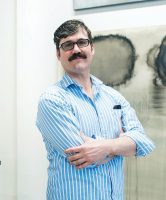And the Boys Go at the Lone Star Film Festival
The Lone Star Film Festival blows into Sundance Square this weekend, bringing with it a talented array of filmmakers. Among the films being considered for the competition side of the event is And the Boys Go, screening its world premiere Thursday night.

It is a perfect example of what Lone Star Film Festival represents for filmmakers, an engaged audience looking for fresh talent and unique work. Matt Hoff and Daniel Luis Ennab, both working as writers and directors on the project, have created an intriguing and auspicious debut that has stylistic traces from another era, inspired by John Cassavetes, Hal Ashby and Bob Rafelson and filled by character dynamics that recall Diner or Stand by Me. Though reminiscent of a time long gone, they engage a fresh understanding of American males.
Cajoling and confused, the portrait of a tight-knit group of young men on a camping trip offers a rare glimpse into the problems of contemporary masculinity. Developed by filmmakers who met and developed the concept at New York’s School for Visual Arts, And the Boys Go is beautifully shot mostly around Mount Greylock in Western Massachusetts. The project evolved from their own high school experiences. Ennab brought Hoff the original script for a coming-of-age epic and the two began refining the story around a similar trip Matt Hoff’s friends had taken when they graduated. When the original location in the Poconos fell through, he knew of a perfect scenic area back home. What began life as a complex story of high school life was shaped into something more intimate full of ripe quiet beats that registers a sincere impact.
Between Ennab’s drafts and Hoff’s editorial refinements, the script found its spare intensity and next they needed to find faces to play it. Hoff explains, “It was difficult because actors are so hard-wired to perform, and we wanted something more natural and less constructed.” In casting these long-time friends, Hoff and Ennab tried everything to find the right combination of talent and chemistry; they had a clear vision of group dynamics which ultimately led them to Ali Zaman, James L. Lawrenson, Jayden Kyle and Nicholas Matthews. Intensifying the brotherhood, the directors had the quartet bunk together throughout the shoot, as Hoff reasons, “We didn’t want them to have any space apart for the entire shoot.”
Ennab quickly adds, “Sometimes we felt like parents behind closed doors. It was the first film for all of us and we went in with a lot of expectations.” The filmmakers’ journey to get the film made had its share of parallels with their young protagonists who are confronting their own expectations about life and friendship. Admittedly, they were not above tricks to pull unique and surprising reactions out of the actors, as Hoff shares, “We would tell an actor to do something different in a scene, but not tell the others, just to see where it would go and keep it fresh.” Each actor shines, but it is driven by the push and pull of the dynamic. Nicholas Matthews who plays Steve, the group’s tall machismo factory, gives a nuanced performance granting pathos to a grandiose character who seems to represent something different for each other character.

Improvisation enlivens performances and the subtle use of two hand-held cameras was key, as Hoff details, “It allowed us to have improv in nearly every scene and maintain continuity.” Packing their gear for a mile in order to get breathtaking scenes, the film taps into a subdued intensity as the filmmakers make superb use of the landscape of the Taconic Mountains. Both admit to a slight camping aversion, which has led them to question how they ended up making a movie about a camping trip, but it was just another part of the process to Ennab, “We had to compromise how we might normally do things in order to get into the nitty gritty of the story. Camaraderie was important, I think the crew was even tighter than the actors.”
Refining not only their project through film school, but also their collaborative style, the duo has found a balanced working relationship that allows them both to remain creative problem solvers. Hoff tends to oversee and organize, dealing with structures, while Ennab interacts with the internal energies of the action or as he says, “looking for happy accidents.” Craftsman understand how to make the most with the least and these two have maximized space and time, viewers can be excited for the future projects from both of them.
 An Austin native, Lyle Brooks relocated to Fort Worth in order to immerse himself in the burgeoning music scene and the city’s rich cultural history, which has allowed him to cover everything from Free Jazz to folk singers. He’s collaborated as a ghostwriter on projects focusing on Health Optimization, Roman Lawyers, and an assortment of intriguing subjects requiring his research.
An Austin native, Lyle Brooks relocated to Fort Worth in order to immerse himself in the burgeoning music scene and the city’s rich cultural history, which has allowed him to cover everything from Free Jazz to folk singers. He’s collaborated as a ghostwriter on projects focusing on Health Optimization, Roman Lawyers, and an assortment of intriguing subjects requiring his research.


 Sign in
Sign in

